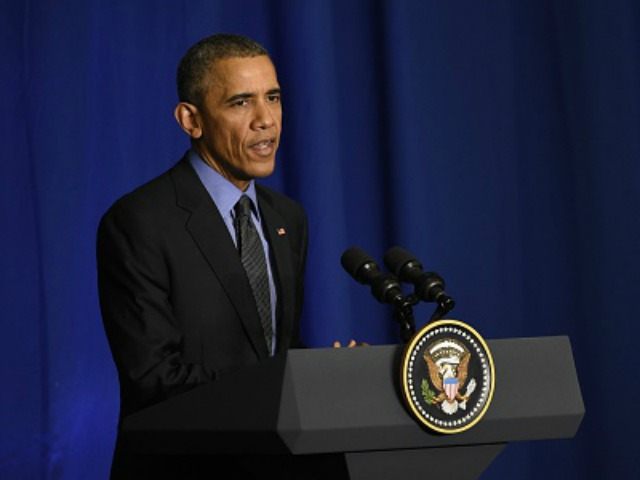It has apparently begun to dawn on the rest of Barack Obama’s party that his strategy of insisting that everything he’s doing is working great, and he’s never made a national-security mistake, is electoral suicide.
The New York Times comically describes Democrats as “eager to put their own stamp on the fight against terrorism,” which might be the least accurate statement the Grey Lady has published this year, and that’s not an easy hurdle to clear. The only thing Democrats are less eager to deal with than Islamist terrorism is the FBI report on Hillary Clinton’s email server.
According to the NYT, Democrat proposals include the creation of an “ISIS czar,” which sounds like something that would come out of a satirical parody of Democrat national-security deliberations. I know – let’s create some new slots in the bureaucracy! That always fixes things! We already have a position to handle ISIS, kids. It’s called “The President of the United States.” The problem is the occupant of the office, not its job description.
The Democrats also proposed what the Times describes as the “continuation of targeted airstrikes on ISIS strongholds and oil supply lines,” without mentioning that we just got around to bombing those supply lines a few weeks ago.
They also want sanctions against nations that “facilitate financial transactions with ISIS,” which ought to work as well as the sanctions that Obama just abandoned against Iran.
Then we’ve got Senate Minority Leader Harry Reid saying his caucus understands “the Syrian civil war will only be resolved diplomatically, with all parties supporting the eventual removal of Assad,” a possibility that seems increasingly remote with Russia and Iran calling the shots after years of Obama weakness.
To address the threat of terrorism, Senate Democrats seek to “tighten a visa waiver program with friendly countries, study encryption technology and improve airport security,” which is odd, because we’ve had a $7 billion Transportation Security Agency – another triumph of Big Government! – working on improving it for over a decade.
And, of course, Democrats are hell-bent on their stupid “strip Constitutional gun rights from people on the no-fly list,” which is the only measure they’re really interested in. They’re back to talking about “closing loopholes,” which should make every liberty-minded American nervous as hell. Also, they’re pulling their usual bait-and-switch routine on gun control, because the list actually referenced by their legislative proposals is vastly larger than the “no-fly” list they keep mentioning.
Not a single one of these Democrat proposals bears the slightest relationship to what actually happened in San Bernardino. Syed Farook and Tashfeen Malik didn’t care about ISIS czars, they shopped around with other terrorist groups before settling on ISIS, they wouldn’t have become peaceable model citizens if Bashar Assad was knocked off his throne, Malik wasn’t on a visa waiver, she waltzed right through Obama’s security screenings, the couple wasn’t on any no-fly list, they passed rigorous background checks to get their handguns, and their rifles were apparently a straw purchase that was highly illegal under current law, possibly including weapon modifications that violated California law. It’s almost as if violent criminals and jihad killers don’t give a damn about Democrat gun control laws.
One Democrat-supported measure that would be relevant to what we know about the San Bernardino jihadis, and which might win bipartisan support, is highly problematic: Senator Dianne Feinstein’s legislation to “require social media platforms, including Facebook, Twitter and YouTube, to alert federal officials about online terrorist activity,” as The Hill describes it.
Tech companies have generally opposed such legislation, and The Hill recounts another Democrat, Sen. Ron Wyden of Oregon, blocking a previous attempt by Feinstein to move her legislation. Free-speech activists worry about vague language in the bill, and of course social-media providers are probably concerned they’ll face legal and financial jeopardy, on top of compliance costs. However, there have been long-standing voluntary efforts to keep terrorist propaganda off social media, and those efforts seem to be intensifying after first Paris, and then San Bernardino.
Internet control is a very tough issue, because every effort to crush terrorist communications carries the threat of harming other forms of expression, creating censorship tools that could be misused for other purposes in the future. It’s clear that social media is a powerful asset for the Islamic State, whose recruiting is reportedly still going gangbusters, despite years of effort to choke it off. In fact, their efforts are now expanding into China.
But Americans are both eager for security, and nervous about surveillance. “Social media companies shouldn’t take on the job of censoring speech on behalf of any government, and they certainly shouldn’t do so voluntarily,” said Danny O’Brien of the Electronic Frontier Foundation, quoted in a USA Today story about Feinstein’s legislation. “Who defines ‘terrorism’? Does Facebook, for example, intend to enforce its policies only against those that the United States government describes as terrorists, or will it also respond if Russia says someone is a terrorist? Israel? Saudi Arabia? Syria? The same questions apply to the speech that might be targeted.”
It’s a tough call… much tougher than Democrats proposing useless, constitutionally-dubious gun-control measures for cultural-signaling purposes, or crossing their fingers and hoping the Syrian civil war ends soon.

COMMENTS
Please let us know if you're having issues with commenting.